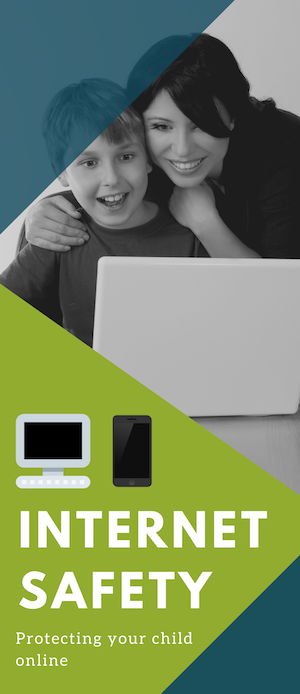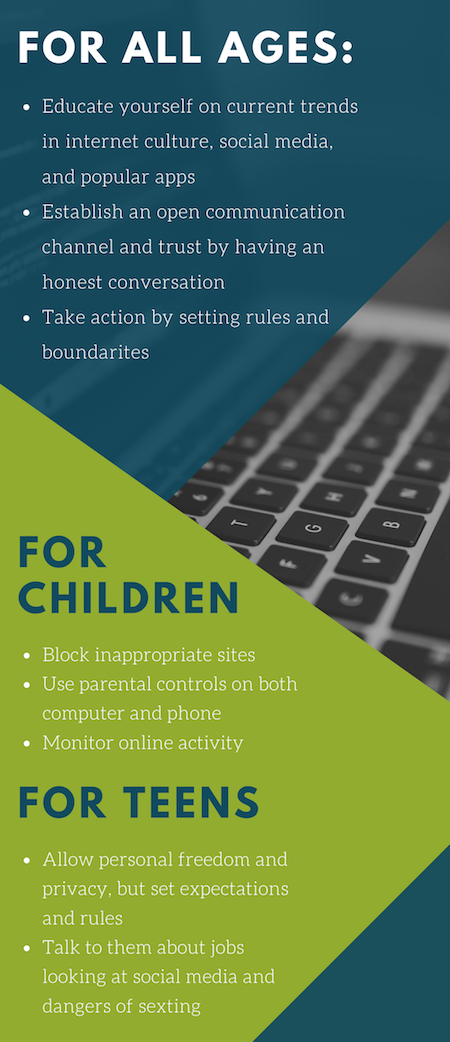Internet Safety
 Children today are growing up in a world completely different from the one we experienced as kids. We are deep in the midst of the “Internet age”, and children are now exposed to it very early in life. Their generation is so deeply intertwined with online technology that it feels like they’re born with the ability to type. Can you count how many times you’ve seen a 10-year-old with the latest iPhone? We could talk forever about how different life was for us when there were no smartphones, no Facebook, or even desktop computers.
Children today are growing up in a world completely different from the one we experienced as kids. We are deep in the midst of the “Internet age”, and children are now exposed to it very early in life. Their generation is so deeply intertwined with online technology that it feels like they’re born with the ability to type. Can you count how many times you’ve seen a 10-year-old with the latest iPhone? We could talk forever about how different life was for us when there were no smartphones, no Facebook, or even desktop computers.
There are good things to the Internet, especially for children and teens. A lot of schools nowadays solely use virtual books, online courses, and online libraries. Children and teens get to communicate constantly with their friends and can play countless video games. But there is a dark side to the Internet. And that dark side can be incredibly dangerous, especially for youths who are still cognitively developing.
You have to worry about a lot of things when it comes to letting your child be online. You can find anything online with a simple search, and that includes inappropriate content. Predators lurk on social media and chat groups posing to be a young person that’s looking to be friends. Teens often share personal details on their social media accounts without thinking about how that information stays online forever. Children can be cyberbullied by friends or strangers. The list goes on and on, but the point is that parents need to be highly aware of what their child or teen is doing online and set rules to keep them away from bad content or people. Let’s talk about the steps you can take to keep your child safe.
 Here’s a sad reality a lot of parents must face. Our children know way more about the Internet and how to use it than we do. There’s a reason why there’s a stereotype about older people not knowing how to use social media. You need to educate yourself about what children and teens are really doing online. Ask yourself: Do you know what a “snap” is? Do you know what it means to “DM” somebody? Do you know how to “post a story” online? If these sound confusing to you, then you need to spend some time educating yourself about what children do online.
Here’s a sad reality a lot of parents must face. Our children know way more about the Internet and how to use it than we do. There’s a reason why there’s a stereotype about older people not knowing how to use social media. You need to educate yourself about what children and teens are really doing online. Ask yourself: Do you know what a “snap” is? Do you know what it means to “DM” somebody? Do you know how to “post a story” online? If these sound confusing to you, then you need to spend some time educating yourself about what children do online.
If you try to talk to your child about Internet safety without understanding the latest technological trends, they will not even bother listening. You’ll most likely get hit with something like “you don’t even know what I’m doing” or “you don’t know how this works”. They’re not wrong, either. You need to become digitally literate.
Regardless of how much you shelter them in the beginning, children will inevitably be exposed to the Internet, so it’s imperative that you have a discussion about Internet safety as soon as they are able to understand. Sit them down and have an honest talk about it. Tell them about how the Internet is a useful tool, but there are boundaries they must be aware of.
Thoroughly explain the dangers of the Internet and give real-life examples if needed. The goal of this talk is to create an open channel of communication between you and your child. You want your child to feel comfortable coming to you when something bad happens online. Having this initial conversation also lets you lay down the rules that need to be followed. Some of the rules you may want to set can include:
- Never posting or sharing personal pictures
- Never revealing or posting personal information (address, phone number, etc)
- Only share your password with parents
- Never agree to meet someone you met online without parental supervision
- Never respond to threatening or vulgar emails, texts, or posts
- Always tell a parent about bad interactions online that felt scary or hurtful
- Keep the computer in a common area where activity can be monitored
- Follow the golden rule online: never posting something they wouldn’t post about themselves
If your child is young, it’s a good idea to use online protection tools to keep your child safe. Remember, the Internet gives a child completely unfiltered access to anything in the world within a few simple clicks, and you need to take action to prevent them from seeing something inappropriate. There are many ways you can block or restrict access to certain sites by using parent-control options on your computer. There is also software you can buy that tracks your child’s online activity. Smartphones also have parental control options that can block sites, apps, and limits the amount of time they can use their phone.
Protecting teens online is a little different than protecting younger children. Teenagers want independence and privacy, and that’s perfectly normal for their age. You should be willing to give them that freedom too, as long as there are healthy boundaries. No teenager likes an overbearing parent that demands to see every text they’re sending, and that may push them to never share their online activity with you.
Make sure you talk to your teen about how social media can affect their real life. Mention how jobs look at your social media before hiring you, and bad posts can ruin their chances of getting employed. Sexting is also a big topic that needs to be addressed at some point. It may be hard to imagine, but many teens have sent explicit images to significant others or friends. Talk to them about the permanency of the Internet and how once something is sent or posted, it never fully goes away.
Taking an active role in your children’s online activity can prevent them from potential danger. The earlier you initiate action, the better the outcome will be. Establishing a strong sense of trust between you and your child will help them open up to you if they are experiencing something bad online. Never let your young child have free-reign access to the Internet before at least having an in-depth discussion about it. And ingrain proper safety techniques into your teen so they can make the right choices on their own.

